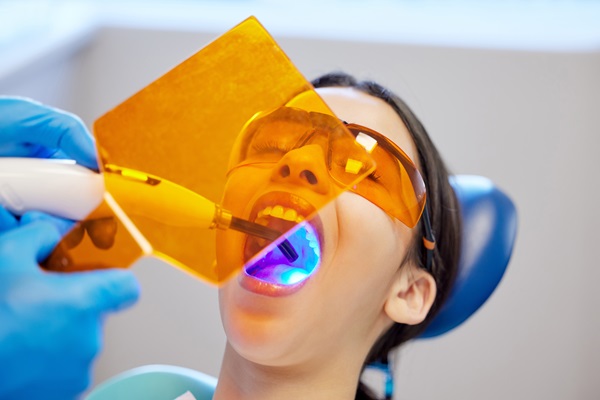Is Dental Bonding the Right Choice for You?

Dental bonding is a treatment that can help correct imperfections in your smile. Dentists often recommend this procedure for chips, cracks, and even gaps between the teeth. However, this procedure does not work for all dental issues. This article covers situations where dental bonding would be the right treatment.
An overview of dental bonding
Dental bonding involves the application of a composite resin to alter the tooth's appearance. The composite material is applied over the teeth and hardened to achieve the desired size and shape. The dentist can use dental bonding to repair small cavities, cracks, and chips in the teeth. The composite material is customizable to match the tooth’s color, meaning any work done will be indistinguishable.
The dental bonding process
At the initial consultation, the dentist will discuss with the patient to know what they expect their teeth to look like. They will then proceed to take X-rays and examine the condition of the gums and tooth. In preparation for the bonding process, the dental professional will match the color of the bonding material to the teeth. Subsequently, the dental professional will roughen the outer layer of the tooth so the bonding material can stick better to that area.
They will apply the composite material to the tooth, and then shape and smooth it. After getting the desired appearance, the dentist will use a curing light to harden the material and bond it to the teeth. After polishing the resin, they will check the patient’s bite to ensure proper alignment. The dental bonding treatment only requires one dental visit and lasts about 30 to 60 minutes.
Dental bonding aftercare
After the dental bonding treatment, patients can continue to care for their oral cavity as they did before. They will still need to brush twice daily, floss once a day, and visit the dentist for regular dental checkups. Besides routine dental care, it is advisable to avoid eating or drinking anything that can stain or contaminate the resin or chewing on hard foods that can break the teeth. With proper maintenance dental bonding can last between three to 10 years. Patients may need occasional restoration treatments.
Who is a good candidate for dental bonding?
Dental bonding candidates need to have adequate enamel and healthy teeth. The dentist will examine the patient’s teeth to ascertain if the procedure will be enough to correct the dental issue. Bonding may be the right choice for those who have:
- Spaces between their teeth are not enough to justify braces or aligners.
- Chipped or broken teeth
- worn down or very short teeth
- Exposed tooth roots due to receding gums.
- Severely stained teeth
- Tooth decay
Bonding requires little downtime and is usually less expensive than alternatives such as veneers.
When dental bonding might not be suitable
If the tooth has suffered severe damage, dental bonding might not be the best option. In some cases, dental fillings can repair bigger cavities. The dentist may opt to protect a cracked tooth with a crown. Also, in cases of severe dental misalignment or gaps, orthodontic treatment may be the better option to restore the smile.
Patients also need to know that bonding is slightly weaker and less resistant to staining compared to veneers and crowns. Some actions may cause the resin to become stained or deteriorate faster than usual. Dental bonding might not be the ideal choice for patients who tend to bite their nails, pens, or other hard foods frequently. Foods such as berries and coffee stain the resin, and smoking discolors it.
Good oral health is an important factor for getting dental bonding. This means there must be enough tooth structure for the composite material to bond to and the teeth and gums need to be healthy and free of infection. Before proceeding with dental bonding, the dentist will ensure patients get treatment for oral issues such as gum disease, oral infections, or cavities.
Using resin to improve the teeth’s appearance does not cause major problems with dental health. In fact, many patients pick this technique as it requires removing only a little bit of the outer layer of the tooth. Bonding is temporary and its effects can be undone. Removing the composite resin does not typically damage the teeth. This means patients can opt for other options later in life.
In conclusion
If you have questions about dental bonding or think it might benefit you, you can contact our dental office today for a consultation.
Request an appointment here: https://www.mytotaldentistry.com or call McCarthy Dentistry at (740) 546-5178 for an appointment in our Marietta office.
Check out what others are saying about our dental services on Yelp: Dental Bonding in Marietta, OH.
Recent Posts
Dental bonding is a non-invasive type of dental restoration. It is a versatile treatment that can be used to fix discolored, cracked, or chipped teeth. The composite is typically applied directly to the patient’s teeth and the treatment is completed in as little as 45 minutes.Composite restorations can also be made at a dental lab…
Dental bonding is not a permanent solution. This is in contrast to dental veneers, which are considered a permanent solution and are used for similar reasons as dental bonding. However, dental bonding can last for several years if the teeth are cared for properly.The following discussion highlights what the dental bonding procedure involves and why…
Dentists often use dental bonding to fix tooth problems. Continue reading to learn more about this type of dental restoration. Many dental patients are opting for this tooth restoration treatment because it strengthens teeth and gives them a natural appearance. Dental bonding also has a much longer lifespan than most tooth repair options. But how…
If you have small defects in your front teeth, dental bonding is a great choice to consider. It is less costly than porcelain veneers and can be a cost-effective alternative for problems such as stained or chipped teeth. Furthermore, bonded teeth do not necessitate any special aftercare. The material used adheres to the teeth well.…


